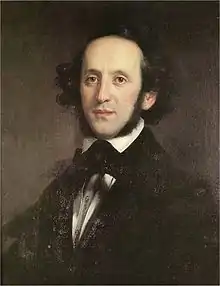Piano Trio No. 2 (Mendelssohn)
Felix Mendelssohn's Piano Trio No. 2 in C minor, Op. 66 was composed in 1845 and published in February 1846.[1] The work is scored for a standard piano trio consisting of violin, cello and piano. Mendelssohn dedicated the work to the violinist Louis Spohr, who played through the piece with the composer at least once.
| Piano Trio in C minor | |
|---|---|
| No. 2 | |
| by Felix Mendelssohn | |
 The composer in 1846, portrayed by Eduard Magnus | |
| Key | C minor |
| Catalogue | Op. 66 |
| Composed | 1845 |
| Dedication | Louis Spohr |
| Movements | four |
Movements
The trio has four movements:
- Allegro energico e con fuoco (C minor)
- Andante espressivo (E-flat major)
- Scherzo: Molto allegro quasi presto (G minor)
- Finale: Allegro appassionato (C minor, ending in C major)
A typical performance lasts just under 30 minutes.
A notable feature of the finale of this work is its use of the melody of a chorale taken from the sixteenth-century Genevan psalter, "Herr Gott, dich loben alle wir", as the culminating melody. The tune is known in English as Old Hundredth from its association with the Psalm 100 and is commonly sung to the lyrics "Praise God from whom all blessings flow." Bach used the chorale as the basis for his chorale cantata "Herr Gott, dich loben alle wir, BWV 130, as the theme in the contrapuntal first movement and as the unadorned chorale in the last. The chorale in the finale of the piano trio has occasionally and erroneously been identified as "Vor deinen Thron", which pictures humans before the Throne of God, a dark and serious chorale as opposed to the triumphal Old Hundredth. Bach wrote a chorale prelude Vor deinen Thron on his deathbed (BWV 668). It was published as an addendum to the unfinished Art of the Fugue, and in the collection known as the Leipzig Chorales.
The opening theme of the finale was adopted by Brahms for the Scherzo of his Piano Sonata No. 3, Op. 5, and Brahms also used the opening of the first movement of this trio as the basis for the piano line in the finale of his Piano Quartet No. 3 in C minor, Op. 60.
References
- See Mendelssohn Essays, p. 245, at Google Books (2013), ed. R. Larry Todd, Routledge, Part II.7. The Chamber Music of Mendelssohn: drafted 1845, retouched during the summer, sent in February 1846 with a dedication to Spohr and published the same month by Breitkopf and Novello.
External links
- Piano Trio No. 2: Scores at the International Music Score Library Project
- Performance of Piano Trio No. 2 by the Claremont Trio from the Isabella Stewart Gardner Museum in MP3 format